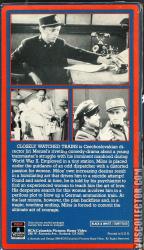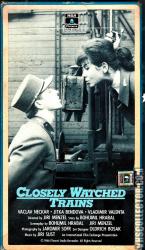Closely Watched Trains
Catalog Number
VH91058
-
Primary Distributor (If not listed, select "OTHER")
Catalog Number
VH91058
Primary Distributor (If not listed, select "OTHER")
Release Year
Country
N/A (NTSC)
N/A | N/A | N/A
N/A | N/A
Ostre Sledované Vlaky (1967)
Additional Information
Additional Information
All it takes to make a man of a boy is a woman.
Czech director Jiri Menzel's Closely Watched Trains (Ostre sledovane vlaky) was the recipient of the Academy Award for Best Foreign Language Film in 1967. In the story, based on Bohumil Hrabal's novel of the same name, Vaclav Neckar plays a Czech railroad worker during the Nazi occupation. He undergoes several philosophical changes as he becomes attracted to the Czech underground. Determining at last that his own existence hardly matters in the scheme of things, Neckar volunteers for a suicide mission. Ordered by the Czech Communist government to return his Oscar, Menzel refused, opting instead to make a "repentance" film which sang the praises of collectivism. This second film has long since been forgotten, while Closely Watched Trains remains on record as one of the biggest financial successes of the Eastern European Cinema.
Closely Watched Trains (Czech: Ostře sledované vlaky) is a 1966 Czechoslovak film directed by Jiří Menzel, and one of the best-known products of the Czechoslovak New Wave. It was released in the United Kingdom as Closely Observed Trains. It is a coming-of-age story about a young man working at a train station in German-occupied Czechoslovakia during World War II. The film is based on a 1965 novel by Bohumil Hrabal. It was produced by Barrandov Studios and filmed on location in Central Bohemia. Released outside Czechoslovakia during 1967, it won the Best Foreign Language Oscar at the 40th Academy Awards in 1968
Bosley Crowther of The New York Times called Closely Watched Trains "as expert and moving in its way as was Jan Kadar's and Elmar Klos's The Shop on Main Street or Milos Forman's Loves of a Blonde, two roughly contemporary films from Czechoslovakia. Crowther wrote: "What it appears Mr. Menzel is aiming at all through his film is just a wonderfully sly, sardonic picture of the embarrassments of a youth coming of age in a peculiarly innocent yet worldly provincial environment. ... The charm of his film is in the quietness and slyness of his earthy comedy, the wonderful finesse of understatements, the wise and humorous understanding of primal sex. And it is in the brilliance with which he counterpoints the casual affairs of his country characters with the realness, the urgency and significance of those passing trains."[8] Variety's reviewer wrote: "The 28-year-old Jiri Menzel registers a remarkable directorial debut. His sense for witty situations is as impressive as his adroit handling of the players. A special word of praise must go to Bohumil Hrabal, the creator of the literary original; the many amusing gags and imaginative situations are primarily his. The cast is composed of wonderful types down the line."[9]
In his study of the Czechoslovak New Wave, Peter Hames places the film in a broader context, connecting it inter alia to the most famous anti-hero of Czech literature, Jaroslav Hašek's The Good Soldier Švejk, a fictional World War 1 soldier whose artful evasion of duty and undermining of authority are sometimes held to epitomize characteristic Czech qualities:
In its attitudes, if not its form, Closely Observed Trains is the Czech film that comes closest to the humour and satire of The Good Soldier Švejk, not least because it is prepared to include the reality of the war as a necessary aspect of its comic vision. The attack on ideological dogmatism, bureaucracy and anachronistic moral values undoubtedly strikes wider targets than the period of Nazi Occupation. However, it would be wrong to reduce the film to a coded reflection on contemporary Czech society: the attitudes and ideas derive from the same conditions that originally inspired Hašek. Insofar as these conditions recur, under the Nazi Occupation or elsewhere, the response will be the same.
Release Date: October 15, 1967
Distrib: Sigma III
Czech director Jiri Menzel's Closely Watched Trains (Ostre sledovane vlaky) was the recipient of the Academy Award for Best Foreign Language Film in 1967. In the story, based on Bohumil Hrabal's novel of the same name, Vaclav Neckar plays a Czech railroad worker during the Nazi occupation. He undergoes several philosophical changes as he becomes attracted to the Czech underground. Determining at last that his own existence hardly matters in the scheme of things, Neckar volunteers for a suicide mission. Ordered by the Czech Communist government to return his Oscar, Menzel refused, opting instead to make a "repentance" film which sang the praises of collectivism. This second film has long since been forgotten, while Closely Watched Trains remains on record as one of the biggest financial successes of the Eastern European Cinema.
Closely Watched Trains (Czech: Ostře sledované vlaky) is a 1966 Czechoslovak film directed by Jiří Menzel, and one of the best-known products of the Czechoslovak New Wave. It was released in the United Kingdom as Closely Observed Trains. It is a coming-of-age story about a young man working at a train station in German-occupied Czechoslovakia during World War II. The film is based on a 1965 novel by Bohumil Hrabal. It was produced by Barrandov Studios and filmed on location in Central Bohemia. Released outside Czechoslovakia during 1967, it won the Best Foreign Language Oscar at the 40th Academy Awards in 1968
Bosley Crowther of The New York Times called Closely Watched Trains "as expert and moving in its way as was Jan Kadar's and Elmar Klos's The Shop on Main Street or Milos Forman's Loves of a Blonde, two roughly contemporary films from Czechoslovakia. Crowther wrote: "What it appears Mr. Menzel is aiming at all through his film is just a wonderfully sly, sardonic picture of the embarrassments of a youth coming of age in a peculiarly innocent yet worldly provincial environment. ... The charm of his film is in the quietness and slyness of his earthy comedy, the wonderful finesse of understatements, the wise and humorous understanding of primal sex. And it is in the brilliance with which he counterpoints the casual affairs of his country characters with the realness, the urgency and significance of those passing trains."[8] Variety's reviewer wrote: "The 28-year-old Jiri Menzel registers a remarkable directorial debut. His sense for witty situations is as impressive as his adroit handling of the players. A special word of praise must go to Bohumil Hrabal, the creator of the literary original; the many amusing gags and imaginative situations are primarily his. The cast is composed of wonderful types down the line."[9]
In his study of the Czechoslovak New Wave, Peter Hames places the film in a broader context, connecting it inter alia to the most famous anti-hero of Czech literature, Jaroslav Hašek's The Good Soldier Švejk, a fictional World War 1 soldier whose artful evasion of duty and undermining of authority are sometimes held to epitomize characteristic Czech qualities:
In its attitudes, if not its form, Closely Observed Trains is the Czech film that comes closest to the humour and satire of The Good Soldier Švejk, not least because it is prepared to include the reality of the war as a necessary aspect of its comic vision. The attack on ideological dogmatism, bureaucracy and anachronistic moral values undoubtedly strikes wider targets than the period of Nazi Occupation. However, it would be wrong to reduce the film to a coded reflection on contemporary Czech society: the attitudes and ideas derive from the same conditions that originally inspired Hašek. Insofar as these conditions recur, under the Nazi Occupation or elsewhere, the response will be the same.
Release Date: October 15, 1967
Distrib: Sigma III






Comments0
Login / Register to post comments